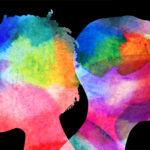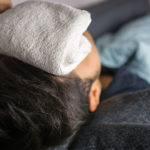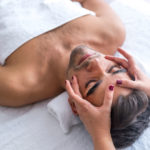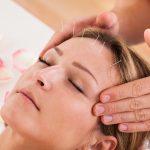Allergy Headaches
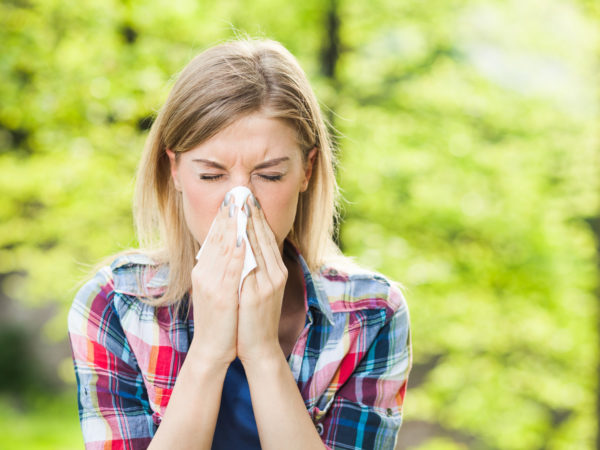
What Are Allergy Headaches?
According to the American Academy of Allergy, Asthma and Immunology, it is “controversial whether constant blockage of the nasal passages caused by allergic inflammation can lead to chronic headaches.”
Research has shown that migraine headaches are more common among people with hay fever (allergic rhinitis) than those without this condition. One study found that 34 percent of people with hay fever had migraines compared to only four percent of those who didn’t. And in people allergic to it, inhaled pollen can trigger the problem. In addition to allergies, changes in the barometric pressure in the spring can affect nerves in the sinuses, nose or ears, which in turn can lead to headaches.
What Are The Symptoms Of Allergy Headaches?
Symptoms of hay fever or other allergies can include frequent sneezing, a runny nose, nasal congestion, itchy eyes and a dull pain in the sinuses in the cheekbones, bridge of the nose and forehead. (Be aware, however, that true sinus headaches are regarded as rare and that patients who appear to have them actually are much more likely to have migraines.)
What Are The Causes Of Allergy Headaches?
Apart from pollen, headaches related to airborne allergies can be triggered by nasal or sinus congestion, stress and certain foods. A report on migraine, hayfever, asthma and allergies by Vincent T. Martin, M.D., co-director of the Headache and Facial Pain Center at the University of Cincinnati, suggests that allergic inflammation might cause migraine and that nasal congestion associated with hay fever could activate the trigeminal nerve in the nose and trigger migraine.
Prevention Of Allergy Headaches
The over-the-counter nasal spray cromolyn sodium may prevent nasal allergy symptoms if you take it before you’re exposed to pollen or other substances that trigger them. For best results, start using it two to four weeks before the start of allergy season. (Note that it doesn’t work for everyone.) Otherwise, take steps to reduce your exposure to pollen and other allergens. Stay indoors as much as possible when pollen counts are high and get HEPA filters for rooms that you spend most time in.
Allergy shots (immunotherapy) – regularly scheduled injections of small amounts of allergens – may be recommended to help prevent reactions. The goal is to desensitize you so that you no longer react to the irritant. Although this treatment is said to work in about two-thirds of cases, the shots can require years of treatment to become effective. They also may elicit reactions such as hives, rash, and sometimes anaphylactic shock.
Conventional Treatment Of Allergy Headaches
A number of over-the-counter and prescription antihistamines can help prevent allergy symptoms. Decongestants can help relieve a stuffy nose that can be one of the causes of a headache. You also can take over-the-counter pain relievers such as Tylenol or Advil to treat headaches. In addition, antihistamines can help treat allergic symptoms, including sneezing and running nose, but also commonly cause drowsiness, grogginess, and dry mouth. Prescription antihistamines are less likely to cause these side effects but still may.
Decongestant pills and nasal sprays can block the effects of histamine on nasal passages and often can help ease nasal congestion, but their effects are only temporary, and overuse can actually worsen congestion over time. These drugs should not be taken by people with high blood pressure. Over-the-counter and prescription eyedrops can help relieve itchy eyes caused by allergens. Prescription nasal steroid sprays can tone down the immune response and combat swelling in the nose, which helps ease congestion. They often can take about 2 weeks to start working effectively.
What Does Dr. Weil Recommend For Allergy Headaches?
Among conventional treatments for allergies, Dr. Weil prefers the non-prescription drug cromolyn sodium (Nasalcrom Nasal Solution). If that doesn’t help, he says you may have to try a steroid nasal spray such as Vancensae, preferably for a limited time. He also suggests trying nasal douching with a warm saline solution to rinse pollen grains off nasal tissues and soothe irritated mucus membranes.
The best natural treatment for hay fever that Dr. Weil has found is freeze-dried stinging nettle leaf. Take one to two capsules, every two to four hours as needed to control symptoms. This herbal remedy works quickly and has no side effects.
To prevent pollen allergies he recommends quercetin, a bioflavonoid found in a variety of fruits, vegetables, and grains. Take 400 mg twice a day between meals, starting at least 6 weeks before the expected start of pollen season.
He also recommends butterbur (Petasites hybridus), which has been used for centuries as an herbal treatment for headaches, back pain, asthma, and painful urinary spasms. Recent research suggests that it may be an effective treatment for hay fever and a means of preventing some migraines. Dr. Weil recommends choosing only butterbur products free of pyrrolizidine alkaloids (PAs), compounds that are toxic to the liver. The adult dosage ranges from 50-100 mg twice daily with meals.
Dr. Weil also recommends the following lifestyle modifications:
- Follow a low-protein diet and try to eliminate milk and milk products. Excessive protein can irritate the immune system and keep it in a state of over-reactivity. The protein in cow’s milk is a frequent offender.
- Try hypnosis, which can lessen or completely prevent allergic reactions and facilitate the immune system’s unlearning of its pointless habits (in this case, an inappropriate response to pollen).
- Consider whether stress impacts your allergy and, if so, take steps to reduce it.
- Consider buying an air filter. He recommends a HEPA (high-efficiency particulate air) filter, which removes particles in the air by forcing it through screens containing microscopic pores. These devices work well and aren’t too expensive. Get one for the main rooms in your house or move one from room to room regularly. Avoid air-filtering equipment that generates ozone (HEPA filters don’t).
Source:
Anna Gryglas, “Allergic Rhinitis and Chronic Daily Headaches: Is there a Link?” Current Neurology and Neuroscience Reports, February 22, 2016, doi:10.1007/211910-016-0631-z


